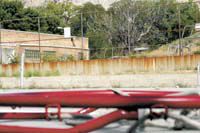| A basketball hoop lying on the ground, weeds wedging through the cracks and rust stains show the age and decay of the tennis courts, which also serves as a basketball court. The tennis courts, adjacent to the closed Helper city pool, could be demolished to make room for the proposed outdoor facility. The city council in Helper passed a motion Thursday to build the pool where the old pool and tennis courts now stand. |
Helper city council confirmed plans Thursday regarding the location of the city’s proposed swimming pool.
The city has already received preliminary approval for grant and loan money totaling almost $1 million.
“We never said where this pool’s going to be,” said Mayor Joe Bonacci at the Sept. 15 meeting.
The mayor pointed out that the pool planning committee had indicated that the pool would be built where the pool and tennis court currently stand in the park on the east side of the city.
The council voted to approve that location, pending a title search and an appropriate surveying of the area.
The council also reviewed the progress of plans for the pool.
At the last council meeting in August, Helper officials decided to seek bids for a bonding agent.
Since money for the project is coming primarily from the Utah Permanent Community Impact Fund Board, the city must meet CIB bonding requirements.
Four bonding agents in the state meet the CIB requirements, reported Jona Skerl, the city’s recorder.
As of last Thursday, two of the bonding agents had returned bids. The two were identical, but Skerl indicated that one of the other two agents was expected to be lower.
The council voted to wait until the next regular council meeting or call a special meeting before accepting one of the bids.
Since the city is advertising for various proposals, Dean Armstrong, a member of the pool committee, suggested that the city move forward with architectural and engineering proposals.
At a previous meeting, Armstrong had suggested that the council take a streamlined approach to the build process. That approach involved contracting concurrent services for architectural, engineering and construction management.
Helper City Attorney Gene Strate researched the approach and discovered that the state had specifically denied that option to cities in 2004.
As a result, the city must take the traditional approach.
The council voted to advertise for architectural and engineering proposals. That brought up some concern, as the bonding agent has not been approved.
The council stipulated that the advertisement would indicate that project funding was pending the completion of the bonding requirements.
As discussion continued, members of the council asked what approach the city would take regarding demolition of the old pool and any structures.
While the possibility of doing the demolition in in-kind services was suggested, councilmember Tony Gonzalez pointed out that the city has one backhoe and two dump trucks.
Demolition would likely take two weeks or more if the city were to do the work. On the other hand, a contractor could likely do the same work in a day or two.
Additionally, the mayor pointed out that in his experience and after talking to other elected officials, contractors usually want to do the demolition themselves. On top of that, the pool house that will likely be demolished is old enough that it may have lead pipes with asbestos insulation. Those types of hazards would be better handled by a qualified demolition crew and not by the city.
The last question regarding the pool pertained to advertising for and hiring a project manager.
“We don’t really have a project yet,” pointed out councilmember Chuck Buchanan, indicating that he would rather wait until the bonding project is completed and the design process was well underway. The council decided in August that it would hire a project manager, but last week decided that the hiring of that individual could wait until some of the initial phases are completed.
In an unrelated matter, the council approved the purchase of 20 acres from the Boy Scouts of America. The Boy Scouts own a portion of Helper’s water supply at Fish Creek Springs.
In August, councilmember Robert Welch brought up the possibility of purchasing that parcel for $8,000. The scouts can’t legally use the 20 acres and indicated their willingness to sell it at a price of $400 per acre.
Since the August council meeting, Strate researched the matter and indicated that a corporate resolution from the Boy Scouts may be in order. County records indicated that the BSA owns approximately 20 acres in the Fish Creek Springs area and can legally sell it.
The council approved a motion to purchase the land for $8,000 pending a title search and any other legal measures that are appropriate. That cost of the purchase is within the water department’s budget and will not require amending the city’s budget.

